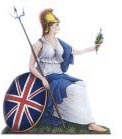War Poets
Historically, we may suspect an antiwar sentiment among most war poets. This is not the case. In Britain and elsewhere, antiwar poetry was an exception rather than a rule.
During the time of Richard Lovelace (1618-1658) war was regarded as an experience that enriched life, a rite of passage. Lovelace's poem is about love more than it is about war. Or perhaps not, in that the relationship of war and love--the tangled relationship of life to death or Mars and Venus--continues throughout antiquity. Richard Lovelace's poem may remind you of the words Hector speaks to his wife Andromache before he returns to the field of battle. Also in the Iliad, Paris desires Helen more than ever before just after Aphrodite rescues him from certain death on the plains of Troy at the hands of Menelaus. In the era of Vietnam, William Broyles tells us that war intensifies sex; Broyles tries to explain the reasons Why Men Love War in an essay published in the November 1984 issue of Esquire.
To read Broyles' essay, click here
Richard Lovelace: To Lucasta, Going to the Wars
Andrew Marvell (1621-1678) An Horatian Ode
As Britain entered the 18th Century, James Thompson (1700-1748) Rule Britannia, wrote jingoist poetry that would further the aim of expanding the British Empire. The poetry is a product of the age, seeking only glory, not understanding.

The song "Rule Britannia" click here
In contrast, Victor Hugo (1802-1885) Russia 1812, wrote poetry in France that underscored the agony of war.
Alfred Lord Tennyson (1809-1883) The Charge of the Light Brigade highlights the heroics of war while suggesting that leadership needs to be questioned. Whatever your reading, Tennyson's poem imagines cavalry action on foreign soil and imagines soldiers at the work of war in a land far away and thus addresses new imperialists.
Herman Melville (1819-1891) Shiloh In America, the Civil War could be regarded as the first modern war, a total war where 1 million Americans perished. Photography was a new science and so the poet was no longer the sole communicator of war: the poet looked at rage, sadness, loss, and futility.
It is important to distinguish between the first of the WW I poets and the poets after 1915. Rupert Brooke (1877-1915) The Soldier ; The Dead and John McRae's (1872-1918) In Flanders Fields urge soldiers to fight on for the sake of the dead. "In Flanders Fields" was first published in England's Punch magazine December, 1915. Within months, this poem came to symbolize the sacrifices of all who were fighting in the First World War.
Charles Sorley (1895-1918) When You See Millions of the Mouthless Dead
Issac Rosenberg (1890-1918) Break of Day in the Trenches
The bleak antiwar poetry of Wilfred Owen (1893-1918) is the most tragic: Spring Offensive ; "Dulce Et Decorum Est" Last line translation: "It is sweet and fitting to die for one's country."
Seigfried Sassoon (1886-1967)
Ted Hughes (1930-1998 ) Six Young Men